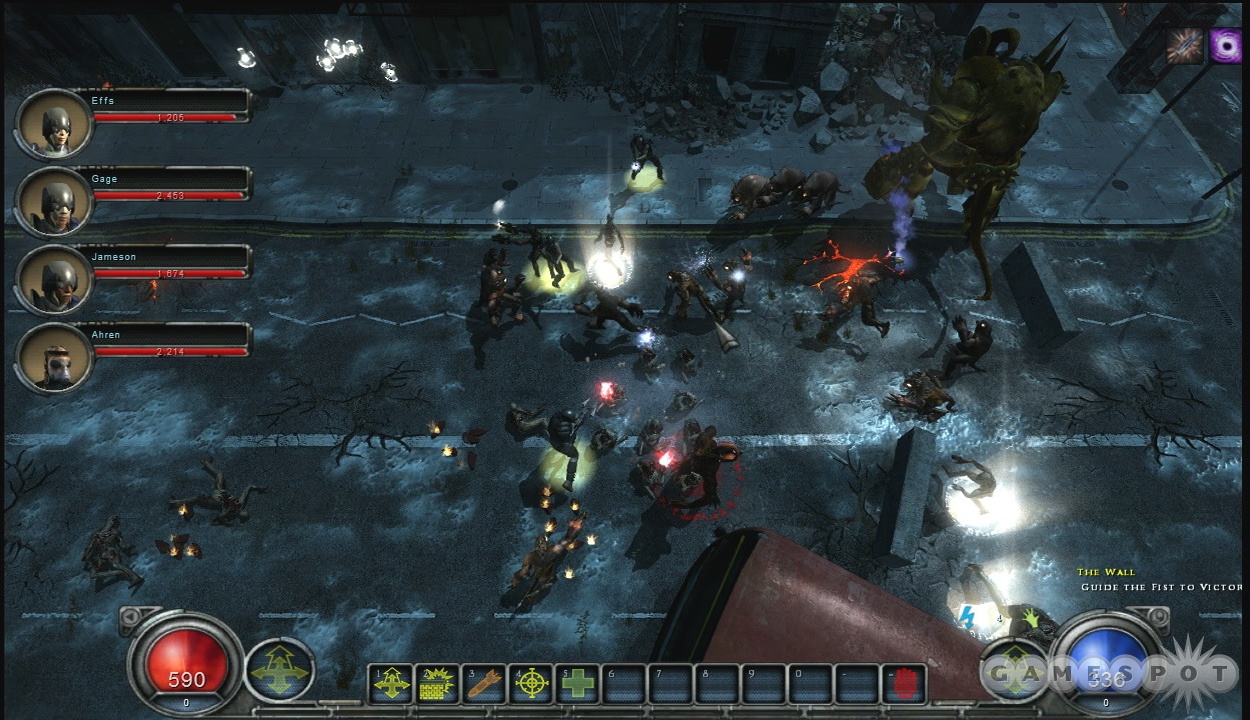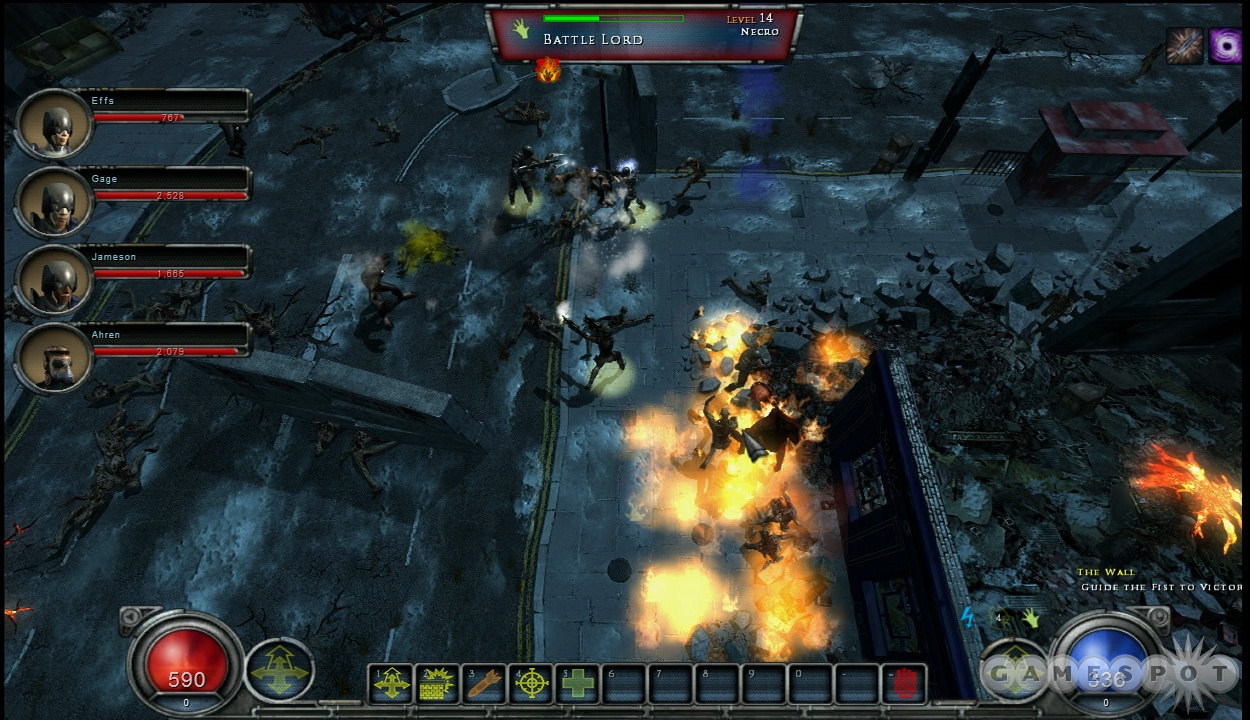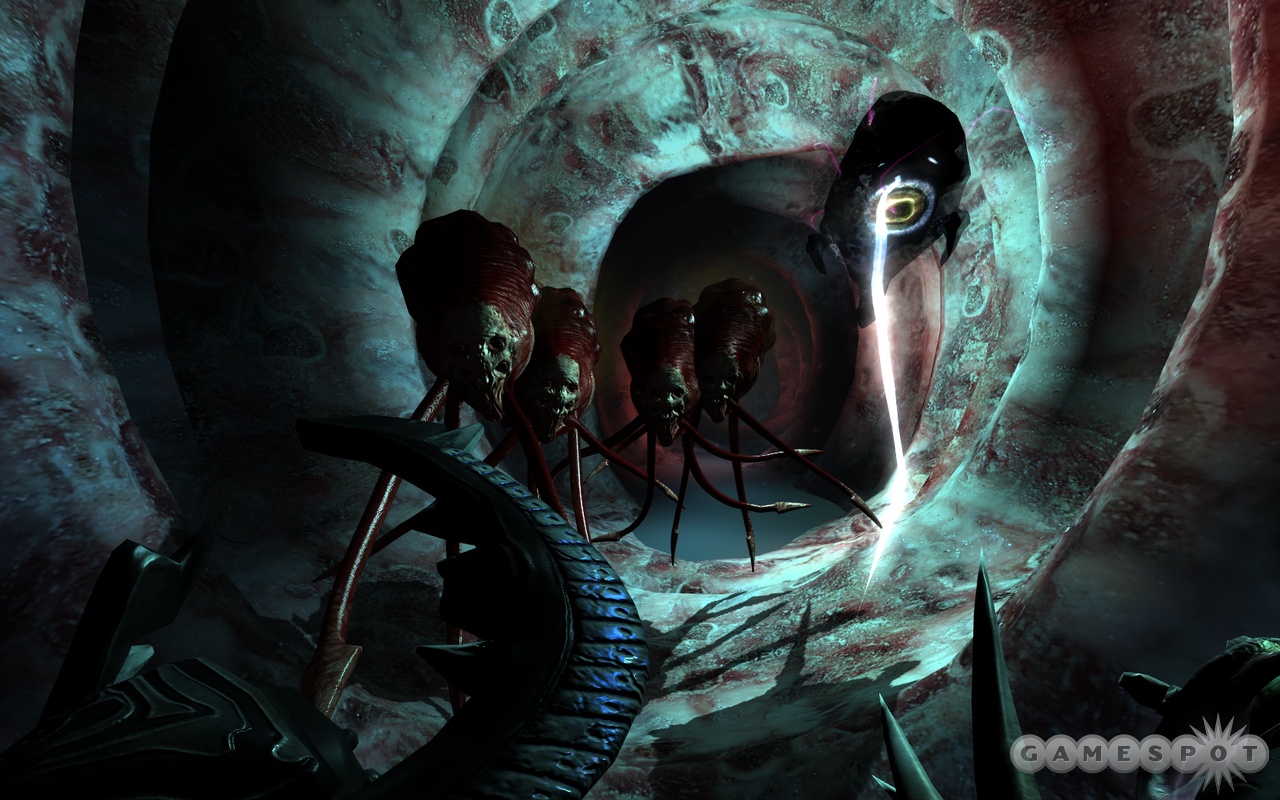Hellgate: London Updated Q&A - Quests and Quest Design
Flagship Studios writer Ivan Sulic gives us a rundown of the interesting and unusual quests that you'll pursue in this action role-playing game.
Hellgate: London is an action role-playing game that doesn't feature a fantasy setting, haughty elves, surly dwarves, or sassy peasants. Instead, this action RPG, which can be played from either first- or third-person perspective, is set in the gutted ruins of a future London after a dimensional portal has opened a rift that allows demons to enter the world. Your job is to kill every demon in your path as you pursue hundreds of quests and try to, hopefully, save the world. To learn more about the mission that you'll pursue, we turned to Ivan Sulic, writer for Flagship Studios. Hellgate: London will ship in late October.
GameSpot: We've heard that Hellgate: London will ship with hundreds of quests. How many are you up to currently? What's the typical quest like?
Ivan Sulic: I believe we're at about 250 quests for launch. There are essentially three primary quest types in Hellgate: London. We have story quests, template quests, and...um...tasks? The names get changed often. Apparently "task" isn't very exciting. Let's just call them, "Those grand opportunities of much astonishing fun."

Anyway, story quests are entirely unique. They are coded to offer experiences that may include minigames, special scenarios and/or events, environment alterations, and scripts not found in template quests. For instance, we have a story quest that lets players control a giant robot. We even have story quests that see the player leaping into the mind of a madman, chasing demons through supernatural rifts, delving the depths of an ever-darkening crypt, assembling a gibbering monkeylike demon from various gruesome pieces, shooting down a massive airborne demon with heavy weaponry, and even participating in several minigames modeled after popular competitive multiplayer modes like king of the hill, domination, and tug of war.
Template quests are pretty straightforward. They are built off eight basic formulas: collect, explore, escort, infestation, hunt, travel/talk-and-do, use item, and operate object. Templates allow us to create quests assigned to different non-player characters without a lot of code work. Their primary function is to give players something to do while they undertake story quests: Going to Bloomsbury because the story said so? You might as well pick up some template-driven side quests that also point to Bloomsbury. It's all pretty self-explanatory: kill stuff, get stuff, save stuff, etc.
The final type, which I'll just keep right on calling "tasks" until someone kills me with a hammer, are combinations of templates and story quests. We code each of these, but we do it in a way that allows us to drop them into the game at various parts. So, we may have a task players can stumble upon midmission, such as "Help me! I've been mauled by that thing over there. It shot purple stuff at my eyes. Most unpleasant. I'm quite sure I've got some kind of infection now. Can you do something about it? If so, you'll first need to do these other three things." Stuff like that.
There aren't so many tasks in the game at present, but there are a heck of a lot of story quests and templates. Our plan for future content includes developing much more of each type but focusing a bit more heavily on the random tasks that may appear during any given quest.
GS: Lots of games feature template quests. For example, you usually have to go out and kill X number of a certain creature or you have to deliver an object to someone. How does Hellgate put a unique spin on them?
IS: Our randomization systems help ensure every potentially mundane activity is unique in its own way. We also try and add a lot of character to our characters. Hopefully, if players are inclined to read quest dialogs, they'll be entertained, amused, or even offended. Anything but bored will work for me.
Aside from that, we try and make sure our primary story quests are as interesting as possible from both narrative and gameplay-design perspectives. Although, we are aware that templates and tasks are only there to enhance those primary quests and give players something extra to achieve while adventuring.
That being said, coding giant robots and real-time strategy minigames is a lot of work. It's just not financially viable to create an entire RPG experience off unique elements like that. And so, like most other developers (as you mentioned), we implement templates and tasks to create more activities for the player. But they also balance out leveling and loot gathering.

GS: We got a glimpse of the "real-time strategy quest" at the EA Studio Showcase. But what is the RTS quest exactly? What do you do in it?
IS: Basically, a templar lord named Maxim isn't the best of leaders. His men can be uncooperative or insubordinate. These particular soldiers have found themselves overwhelmed by a demon attack in an area they were commanded to hold, and they're now incapable of doing their jobs effectively. A nobler templar lord recognizes this and sends the player to directly command this unit of scrubs, and an RTS is born!
The Hellgate RTS mechanic is comparable to one of those Command & Conquer or Starcraft single-player levels where the player is given control of a small group of units without any base-building capabilities. In our game, players must use this small group of units and point and click their way to victory, prioritizing targets and moving troops as needed.
The RTS quest also carries a simple leadership theme. We try and break some of our quests up into themes, like leadership, which tie into the main objective of the game. That objective is to find five "truths" of man. Think of them as physical representations of qualities most in keeping with the "creator." Demons, of course, serve as opposites of those qualities. The truths are all nicely themed, too.
GS: Tell us about the "Galaga quest." (When we think Galaga, we think of the classic fixed-shooter arcade game from the 1980s.)

IS: Sounds like you're talking about a quest we call "The Big Gundown." It provides players with an opportunity to use some turrets against an enormous flying demon that's dropping tons of smaller ones on to the heads of hapless folk. Basically, you blow the holy hell out of the demon with turrets.
GS: We understand that there are also faction-specific quests that you won't see unless you play as a certain class. What can you tell us about them? Is there anything special worth calling out?
IS: Actually, we cut those. They just weren't fun. We pulled them all and are reworking them right now, so you'll likely see them in a future update. There wasn't a lot of incentive to do these faction quests we had. Players basically got faction points that were as much use as play money at a real bank. And it was confusing too.
More faction stuff might come in our first or second patch. Our chief vision officer, Dave Brevik, has some great ideas in regards to improving our faction system. Since he also programs it all, I would say new faction stuff for ongoing content is a given.
GS: In your opinion, what's the secret of good quest design? Are there any general rules of thumb when designing a quest for Hellgate?
IS: Secrets? There are none. Just use some common sense.
If you're making a Japanese RPG, for instance, perhaps you shouldn't have a story about some boy with amnesia that wakes up with his father's sword and suddenly goes on a grand adventure with a flamboyant tagalong. And if you're making a Western RPG, maybe you should cut down on the orc slaying some. Not every town needs a wizard to kill that jerk of a dragon that's been eating all those cows, you know. That's all narrative, though. In terms of mechanics, I think a good design is one that plays off the strengths of your base systems but does not rely on them.
We have a solid action RPG foundation in Hellgate that features customizable characters, deep skill use, and highly randomized environments, weapons, items, and monsters. That alone makes wandering around any given level and killing things worthwhile. What do we then do to make the entire experience more enjoyable? To make unique quests interesting? We simply create those unique experiences I mentioned above. None of them are too radical and none of them negate the base gameplay. But, all of them allow players to do something extraordinary while they're enjoying the game's core features.
GS: While the game will be free to play online, Flagship is also producing ongoing content for those who choose to subscribe. What sort of quest development can we see going forward?

IS: Everything. We're going to new places, we're doing new story, we're adding more templates, we're adding more tasks, and we're adding monsters, items, weapons, classes, features, modes, and more. Seriously, we're continuing to work on absolutely everything. Unfortunately, it'd be premature for me to elaborate on exactly where we'll take ongoing content and why.
GS: Finally, what's your favorite quest and why?
IS: I think I like the Mind of 314 best. It's a simple change of venue--stomp around some poor bastard's brain instead of the street he lives on--but I love our Lucious and Techsmith 314 characters. One is insane, the other is comically suicidal. I find their dialogue to be irrational and totally nonsensical, but then how often do you see that kind of thing in massively multiplayer online role-playing games or RPGs in general? Most MMO quest blocks are so boring people don't even bother to glance at them. At least with these two characters, players may chance upon the term "Taco Fort!" What's not to love? I suppose "Hold Fast" (the RTS quest) and the competitive multiplayer spins we do at the end of the game are far and away the most interesting in terms of functionality, though.
GS: Thank you.
Got a news tip or want to contact us directly? Email news@gamespot.com
Join the conversation